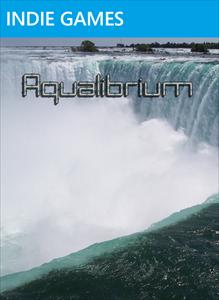 I really didn’t know what to expect from Aqualibrium. The previews made it seem like it could be either puzzle-heavy or platforming-heavy, or both. It could even have been a shooter. I got a titanic sinking feeling (sorry) when I discovered it’s very much a puzzler. I’m not averse to using my brain, and with a bit of care can be caught doing it on a regular basis, but puzzle games tend to trouble me. Unless you think in the specific pattern that the developer intended, the puzzles can be impenetrable. Fortunately, Aqualibrium doesn’t have that problem.
I really didn’t know what to expect from Aqualibrium. The previews made it seem like it could be either puzzle-heavy or platforming-heavy, or both. It could even have been a shooter. I got a titanic sinking feeling (sorry) when I discovered it’s very much a puzzler. I’m not averse to using my brain, and with a bit of care can be caught doing it on a regular basis, but puzzle games tend to trouble me. Unless you think in the specific pattern that the developer intended, the puzzles can be impenetrable. Fortunately, Aqualibrium doesn’t have that problem.
The first thing that struck me as I played was the water. As the name might suggest, the game is all about manipulating water, so it’s important that this works in a believable and – crucially – a predictable way. It’s too easy to have a fluid substance like water behave erratically, and since I’m already not the biggest fan of puzzle games a series of failures thanks to unpredictable in-game results could be enough to condemn a game to a grisly verbal execution. The water in Aqualibrium, though, behaves superbly. If you position a block in a certain place and open a certain hatch, the water will consistently flow in a particular way every single time. That was a relief, but what impressed me was the way this mass of little blue rectangles moves approximately like real water. Little trickles running off an imperfectly-placed dam, and a flood will mass above a switch before suddenly gushing forth when the way opens. It’s such a small thing, but it really did make all the difference for me.
Now I’m done gushing (sorry again) about the water effects, let’s get to the meat of the game. Aqualibrium is all about getting water from various reservoirs around the room into a funnel at the bottom. Once you have collected enough water in the funnel, the room is over and you move on. You don’t have to collect all the water available (and more usually continues trickling into the reservoirs in any case) but you will need most of it. This usually involves working out which hatches to open, where to place your limited supply of  mobile blocks, and which switches to hit when. There’s a degree of trial and error involved, as you won’t always know what the effect will be of trying a particular approach, but it rarely feels frustrating. If your approach obviously isn’t working out you can restart the level in seconds, and thanks to the water’s consistent behaviour you can rely on getting the same actions getting the same results.
mobile blocks, and which switches to hit when. There’s a degree of trial and error involved, as you won’t always know what the effect will be of trying a particular approach, but it rarely feels frustrating. If your approach obviously isn’t working out you can restart the level in seconds, and thanks to the water’s consistent behaviour you can rely on getting the same actions getting the same results.
I once heard infamously acerbic reviewer Yahtzee Croshaw refer in his review of Brutal Legend to the old board game Mouse Trap, and the satisfaction of setting up the various components perfectly so that they unfolded to their “perfect crescendo of brightly coloured plastic”. That feeling is present and correct in Aqualibrium, too. When you get a handle on the best way to direct your water supply to the funnel, open the relevant hatches and place the relevant blocks, it can be potently satisfying to open the reservoirs and watch it all come together just as you planned. Those are Aqualibrium’s greatest moments.
Sadly, it has its share of weak moments to balance out the highs. For a start, it’s all quite badly explained. For the first two or three levels I resorted to blocking off passages with my own head because there weren’t any collectable blocks lying around. The tutorial indicates that these blocks must be picked up, and it was a few levels before I realised you usually start off with some in your possession. I know I’m not the only person who has fallen prey to this.
The blocks themselves are a huge inconvenience. They are completely essential for directing the flow of water, but blocks you have already placed will be picked up again and stuffed back into your pocket if you so much as breathe in their direction. This can result in the game’s few frustrating moments, when an otherwise perfect set-up falls apart mid-execution because you passed fractionally too close to a placed block. This could easily have been remedied by assigning ‘pick up block’ to a button.
The levels introduce patrolling enemies very early on, and these aren’t a problem, but it’s not long before automatic turrets start to 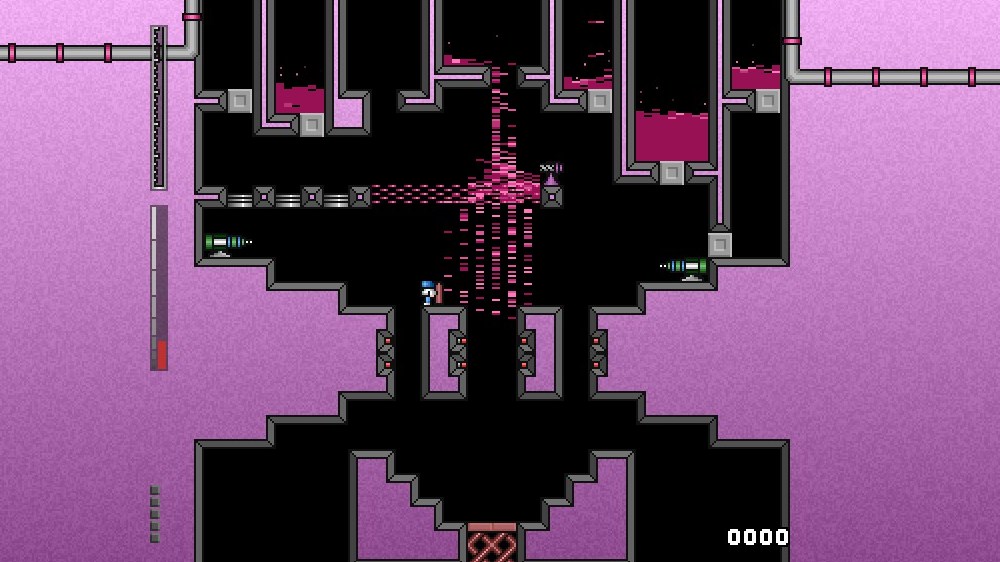 make an appearance as well. By the time you’re about eight to ten levels in, these turrets are beginning to appear in such a way that you are regularly caught in a devastating crossfire when all you’re trying to do is move across the room to get a look at the water’s route. This would be irritating, but not a deal breaker, if not for the game’s biggest flaw: death.
make an appearance as well. By the time you’re about eight to ten levels in, these turrets are beginning to appear in such a way that you are regularly caught in a devastating crossfire when all you’re trying to do is move across the room to get a look at the water’s route. This would be irritating, but not a deal breaker, if not for the game’s biggest flaw: death.
When your character dies, the game quits to a leaderboard, which you are forced to view for several seconds, then back to the title menu. This means that every time one of these unfairly positioned turret crossfires lands a single hit when you’re trying to make sure your set-up is ready, you have to spend a minute or so waiting before you can get back into the level. How anyone could have thought that was a good design choice is beyond me.
It was that galling drawn-out death feature that ultimately soured me on Aqualibrium. It’s a clever, but not brutally difficult, puzzle game that is easy to learn and satisfying to play. It has its flaws but would still be easy to recommend, if it didn’t sadistically force the player to spend so much time waiting. This seriously harms the game and means that I must taint my recommendation with a cautionary label: for 80 Microsoft points Aqualibrium is a fun and engaging use of a couple of hours, but be prepared to spend as much time staring at the leaderboard as actually playing the game.
Overall Rating: 




© 2012 – 2013, The Indie Mine. All rights reserved.

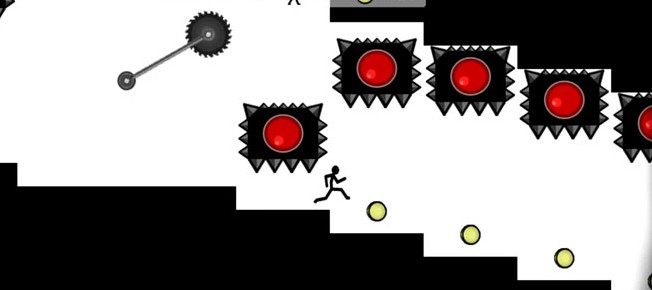
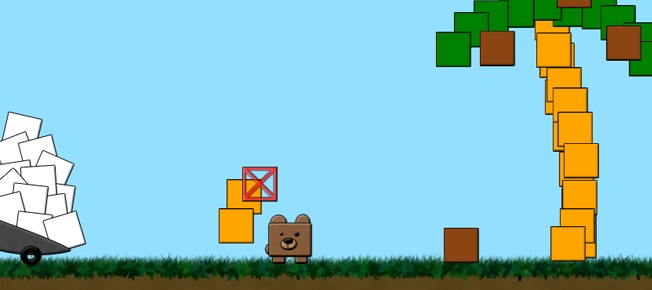

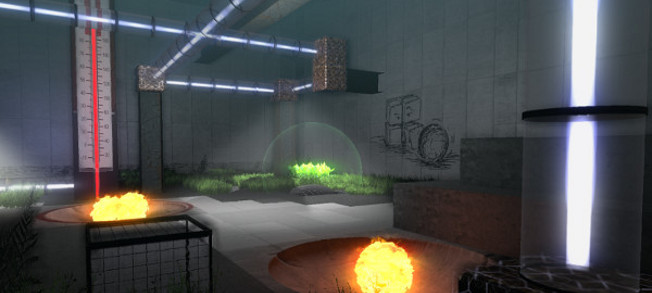
Ah, Aqualibrium. It’s like dating a really pretty girl that could never just get her shit together. Every time I read about her… ahem, the game, I mean, it makes me sad to realize what could have been. My sincerest hope is that Archifishal Software decides to either make a sequel or update the original, to remove the cannons. Or, at the very least, take out some or fix their fire to a singular form. The game should be all about the water.
Also, the long wait between retries is annoying, though I believe there is an option to return straight to the level select screen and bypass the leaderboards. Don’t quote me on it.
Wow. That’s amazing. It’s Cataclysm!
http://www.youtube.com/watch?v=VMlZ2MwYvuA
Holy hell! It really is! It’s not even a re-skinned copy, it is a wholesale duplicate. I’m stunned.
Ok, apparently the creator of Cataclysm gave his blessing for a port of the game to XBLIG, and the reason it was re-titled Aqualibrium was because Blizzard owns the name Cataclysm these days (I think it’s a World of Warcraft expansion or something).
Still a crazy story, how this all went down. A happy ending though, as it brought a decent game back from the brink and gave it a new audience on XBLIG.